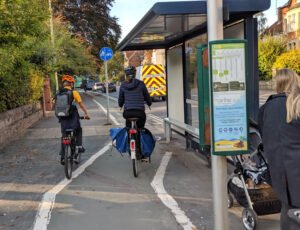Learning to love our buses again
By Brenda Boardman
Brenda is a trustee of Low Carbon Oxford North
We are gradually getting back on to our buses as fears about Covid subside. The government is encouraging us with the £2 single fare on most buses within Oxfordshire. This will last until the end of March, so make the most of it while it is there.
Take the kids on the top of the bus to see the views, go and visit that special friend or relative, use buses to explore the county.
Up until now, policy and decisions on our buses have been left mainly to the bus companies and the transport authority – Oxfordshire County Council. They don’t always work together. Under pressure from the government, there is to be greater coordination between them through an Enhanced Partnership Plan. A number of working groups will be set up to cover issues like punctuality and how to speed up the buses. Two of these groups are to be focused on the issues that we, as bus users, are concerned about and we hope bus users will be represented in these groups. Ideally the people speaking on our behalf, as bus users, will come from a newly-formed group: Oxon4Buses, or O4B.
Oxn4Buses
O4B has been meeting since November 2022 and wants to make sure that the interests of bus users are at the centre of all decisions about buses. For instance, if there is a proposal to change a bus route or the level of service, we are asking that this should be announced well in advance, so that people can use it more and perhaps ensure it is kept open. Other issues that we have identified are:
- Availability of good-quality real-time information. Is the bus actually coming, or only ‘due’?
- Providing some shelter at most or even all bus stops.
- Making bus-company websites more user friendly.
- Allowing all travellers to to pay fares in cash, even if it this means paying in advance via a token bought in a shop.
Buses are essential

We know that for many people, the bus is the main and essential mode of travel. A third of households in Oxford city do not have a car. In the other four district councils of Oxfordshire the proportion of non-car households is lower, between 10 and 15%. But even in households that have a car, it may not be available to all the members of the household at all times. One person may be using it for work, and some household members may not be able to drive. Good bus services, that are well run, inexpensive and attractive, are essential in a fair society. Good bus services also reduce congestion on our roads, which makes them safer for cyclists, and gives more choices to households.
Reducing carbon footprints
This is in addition to the environmental benefits: a full bus replaces a lot of cars, which means less pollution and less congestion. Fewer cars means quieter roads, buses keeping to schedule and everyone arriving promptly at their destination. As more of our buses become electric – and 159 electric buses are on order – these benefits will include lower carbon-dioxide emissions and a reduced impact on our climate.
The future is bus-shaped.
If you are part of a group of people concerned about bus usage and want to contribute to O4B, please let us know: info@oxon4buses.org.uk. We also want to know what improvements you would most like to see, to help you use your local buses more.

3 Responses
[…] need to discover how to use the car less and travel by bus or bike […]
[…] are increasingly aware of the value of staying local and not being dependent on cars or infrequent buses for most of their […]
[…] Oxford is remarkably well served by its buses, which are punctual and frequent, provided you can get your head around the complexity of the […]